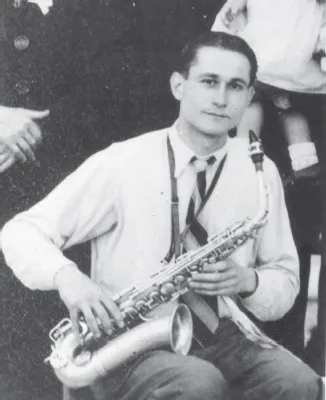![]()
CHAPTER 1
Still Free
The Phony War
September 1, 1939: The German army invades Poland.
September 3, 1939: Great Britain and France declare war on Germany and order the general mobilization of their armed forces. That Sunday morning, at the Saint Hilaire church of Mareuil, the eighty-four-year-old priest, Father Schmitt, ended his sermon with these prophetic words: “Justice will triumph!”
The days that followed were spent with anxiety about what would happen next. I remember having asked my father, a veteran of World War I: “How long will it take for the German planes to come to us? Will we be warned? Will we have the time to seek shelter?” For us, the shelters were the Champagne cellars. And there was also the fear that gas might be used. Since nobody had a gas mask, everyone looked for a way to get protection. One way was to use crystals of thiosulphate soda. The sale of this product in the pharmacies set a record.
The Champagne region was located in the “zone of the armies” or “war zone.” In the first days after the mobilization, cities and villages were transformed into garrison towns. As far as Mareuil was concerned, the Sixth Engineer Regiment from Angers, that is, approximately three thousand soldiers, invaded the village. At the west entrance of the village, in the direction of Aÿ, there was a mansion that had been the property of a lady by the name of Madame Etienne, but the mansion was known as the “chateau Gossard,” after the name of its original owner. Because it was unoccupied since the death of its owner, the British Royal Air Force had installed in it a military hospital. Among the soldiers billeted there was an interpreter who spoke French extremely well. On the whole, however, the people of Mareuil did not have much contact with these men. For a while, in the town of Aÿ, the British had installed anti-aircraft batteries in the park close to the canal.
The Royal Canadian Air Force occupied an air base on the south side of Mareuil, where the flat and vast plain of Châlons begins, on the right bank of the Marne River between the villages of Oiry and Plivot. Its planes were Hurricane fighters, which had one wing painted white and the other black. I remember that, a few years before the war, I had witnessed the work of bulldozers that prepared the tarmac. Bizarre coincidence, no?
Most people, including me, had faith in the final victory of the Allies over the Nazis. In the first days of the war, we were told that French troops had entered the Saar. And then, there was the impregnable Maginot line! This was true. But the Germans never really attacked it. Its major defect was that it did not go far enough to protect the frontier, for it stopped near the forest of the Ardennes. This fortress was occupied by special regiments that were relieved often enough, for the men in it, after a certain time, became affected by claustrophobia. Since 1938, to lengthen the Maginot line, fortified blockhouses had been built to stretch all the way to the North Sea. But rumors said that some were not deep enough for the recoil of cannons. Was it true? What is certain is the fact that there was quite a bit of sabotage done and that the French system of defense was muddled.
Posters plastered on walls proclaimed: “We will win because we are the stronger.” Other posters called for the donation of scrap metal to forge the “victorious steel.” The chief of the allied forces was a French general, General Gamelin. His claim to fame was that his name was given to the hole in which each soldier would seek refuge when attacked. He turned out to be an incompetent leader. At the beginning of the hostilities, the Allies organized the blockade of Germany, on the ground and at sea, hoping to keep it from obtaining raw materials and food, thereby shortening the war. They had not foreseen that the Soviets would provide aid to Hitler. They furnished him with oil and other raw materials. The Germans also made synthetic fuel out of coal.
After a few weeks, as nothing was taking place, the French population settled itself into what became known as the “phony war.” In the region where I lived, the villages had two or three times more soldiers than civilians, and many contacts took place between them and the civil population, especially the young. With my friends, I would go out on Sundays in the company of several soldiers. Those that were closest to us were from Picardie, a region north of the region of Champagne. They spoke with a sort of old French that amused us. Sometimes, they would confide in us their anxiety about what might come next. They would mention much disorder in their military units. For example, they told us that the guards of their camps did not have any bullets in their rifles. One day, one told us in his Picard way: “If the Germans send parachutists, they will do what they want.” These soldiers also told us about the incompetence of their officers. They respected only one, a captain by the name of Leclerc.
I got acquainted with a few musicians who had been members of the regiment’s band. Because the band had been dissolved at the beginning of the war, they were idle, but they had their musical instruments. I asked my parents their permission to invite these men to our house to make music. My mother responded by saying that it would keep my baby brother Jean from falling asleep. I ended up by convincing her that the music would in fact rock him to sleep.
Thus, one evening a week, we would be in my house to make music. We really were a small orchestra. We worked on the orchestration of small classics from the Salabert editions to which I subscribed. There was a flutist, Raymond Marandy from Bordeaux, who had received a prize from the music conservatory, a clarinettist, Claverie, and a tuba player whose name I have forgotten. My sisters, Jeanne and Rolande, would play their mandolines, and I would play the part of the cello with my saxophone. We had a lot of fun making music, and my little brother would sleep like a dormouse.
The village was without a priest after the death of Father Schmitt on October 21, 1939. An army chaplain would say mass for the parish. A group of youth formed a choir that I directed, and, some Sundays, Raymond Marandy played his flute during mass. He interpreted for us, among other pieces, the famous Meditation from the opera Thais of Jules Massenet. There was also a young opera singer, Renée Sorgue, who was at her grandparents’ in Mareuil. She would sometimes sing solo, accompanied by Monique Philipponnat at the harmonium. Unfortunately, Renée died of tuberculosis at the age of twenty, at the beginning of the German occupation.
My sisters, Jeanne, Rolande, and Micheline, were taking piano lessons from Monsieur Carteret, professor of music in Epernay. I got to know him before the war when I was a member of the Epernay municipal choir of which he was the director. Beside the piano, Jeanne practiced the harmonium so she could play at funerals during the week. She would practice every day during the noon hour, playing over and over again the “joyful” portions of the mass for the dead! During that time, I practiced playing my saxophone in my room on the second floor of the house.
Before the war, I was also a member of a jazz orchestra in Epernay. The name of that orchestra was “Patro Jazz” because it was associated with the Catholic patronage, or youth club.1 At the trumpet there was Jean Houlmont, at the drums, his brother, Roger. There was also an accordionist and a pianist, but I have forgotten their names. We gave performances at the movie theater of the patronage, which had 1200 seats and a large stage comparable to that of a normal theater. We played as well in church fairs in the region, and we had the occasion to play at dances. At the beginning of the war, we stopped our activities when a British infantry regiment established its quarters inside the patronage. However, after some weeks, Jean Houlmont, who lived on the same street, managed to come in contact with some officers and got permission for our orchestra to continue to make music in our usual place. We then resumed our rehearsals. We played our full repertoire of classic jazz, which the soldiers appreciated with enthusiasm. One of them, whose name was Jeff Craven, played the piano without ever having learned the rudiments of music. I remember that he would interpret The Swan of Saint-Saëns to perfection. We had the occasion to perform the background music during performances of their theater of the armies. The theater of the patronage was full of soldiers, and much beer was consumed. We also played several Sundays at the French Soldiers Club of Epernay with an authentic Tyrolian singer, Debau. He was, I believe, one of the rare French Tyrolian singers. He had cut several records. As a cellar man by profession, he was employed by the Champagne firm Moët et Chandon. In Epernay, there was also, among others, a regiment composed of hotheads who were called Les Joyeux, the “Merry Men.” They were responsible for numerous fights in the cafés of the city, which caused quite a bit of damage.
During this period, a radio show in French was broadcast from Stuttgart, starring a man by the name of Fredonnet, who was called in France “the traitor of Stuttgart.” Oddly, he was well informed about all that took place in the “zone of the armies.” He would give us news about our own region. That proved that the German intelligence services were well organized. There was the famous “fifth column,”2 which was going to win fame from May to June 1940. On this score, in Mareuil, in the rue d’Avenay, at the end of the village, there was a house in which a supposedly retired Norwegian consul and his wife and daughter lived. The latter was so skinny that the girls of Mareuil called her “fine needle.” After the attack of the village on May 10, 1940, men from the Passive Defense alleged that they had seen him giving signals to German planes. These men took justice in their own hands and killed him on the spot. In Aÿ, there was also a manufacturer of paillons,3 who made himself pass for a Luxemburger. He had been several times convicted of indecent acts, and I believe even of pedophilia. One day, he was deported from France. However, we saw him again as a Lieutenant of the Wehrmacht!
The winter of 1939–40 was harsh and long. The temperature went down to minus five Fahrenheit, and with this intense cold there was much snow. The canal was frozen over, as were ponds left by floods from the Marne River in the plain of Oiry. This made for beautiful skating rinks, and we all enjoyed them. During the whole winter, a barge was moored in the port of Mareuil. It was transformed into a movie theater. That gave us some entertainment on Sundays when we were not going to a movie in Epernay. We were still the same band of friends, but Hubert Remy was missing, for he had been mobilized.
In April 1940, Monsieur Foret convened the Grande Fanfare Champenoise for an informational meeting, which he concluded with these words: “If nothing happens before the end of the month of May, we can suppose that the war will end, as will the effects of the blockade. Then, we will be able to have our rehearsals again.” Well, the man was fantasizing!
One evening near the end of April, after sunset, we heard the noise of an airplane motor, a sort of wailing, similar to the sound of a siren. We rushed to the door of the house. The sky was illuminated by the light of a great fire. It was from a German plane that had gone down in flames. It fell into a park at the entrance of Avenay, and the whole crew was killed. Of course, my father and I went running in the direction of the crash, but we were not able to get close. Many soldiers ran with us, and I remember a somewhat comical detail. One soldier, with a strong Mediterranean accent, told another: “If I flinch, you will support me, no?” This was our first taste of the real war.
![]()
CHAPTER 2
The Real War and the Exodus
On May 1, I started an unskilled job in the De Ayala Champagne firm of Aÿ. I took the job because I would earn double what I was getting as an assistant pharmacist. Also, I was thinking that it would not be long before my class1 was mobilized. The work was hard, and the difference in temperature between the underground cellars and outside, where it was very warm, did not take long to make me sick. Thus, I worked there barely two weeks.
During the night of May 9 and 10, I was sick; I had problems with my adenoids. Near midnight, I got up because I was nauseous. That woke up my father, who also got up. At that moment, we heard the humming of motors. We went down to the landing of the kitchen door. Once outside, we became aware that the noise came from planes, and there were many. We went back to bed, but, on the morning of May 10, I was suddenly awakened by the noise of motors and machine-gun fire from airplanes. At that moment we became aware that the German attack had started and that the real war had begun. During the days that followed, we did not worry too much; our confidence in the Allied armies was unshakable. But later, we were inundated by long and compact lines of people that were evacuating the Ardennes and by convoys of troops going in the opposite direction toward Belgium. Soon, an office of the Liaudet Enterprise, abutting our house, became a depot of explosives, and soldiers loaded them unto trucks to bring them to the front. There was always a truck in front of our house fully loaded with enough explosives to blow up a good portion of the village.
The following Monday, the day after Pentecost, along with Monsieur Gotrot, his son Loulou, and my sisters Jeanne and Rolande, I went out to pick lilies of the valley in the forest of Reims above Louvois. As we were walking, we were surprised by low-flying airplanes, and we sought refuge in the ditch alongside the road. However, this did not stop us, and we continued our outing. During all the time we spent in the forest, we heard the noise of the carousel of planes above Reims and of the anti-aircraft guns. During that week, we continued to live as usual. From time to time, we witnessed planes passing by and occasional aerial fights. Often, we watched the take-off of British Hurricanes. The traitor Fredonnet at the Stuttgart radio regularly mentioned the names of bombed cities and would announce to us the bombing of Mareuil. We did not want to believe him, but on the morning of Sunday, May 19, it was our turn. I was getting ready to go to mass when Stukas arrived above Mareuil. We all went down into the cellar under our house. The first wave dove on a paillon factory between Mareuil and Aÿ, some one-third of a mile from our house. These planes were equipped with a siren and their bombs with whistles. All that made such a terrifying noise that it led to some panic in part of the village’s population, but not everywhere. That morning, my brother Roger was at the barber,2 whose customers, including him, went out on the street to look calmly at the spectacle.
The same day, around two o’clock in the afternoon, a new wave of Stukas bombed the whole length of Mareuil. Fortunately, the bombs fell beyond the limits of the village, and they did little damage. Since the Champagne cellars were too far from our neighborhood, we took refuge in our house cellar, the ceiling of which was well vaulted, and our panicked neighbors came to join us. My mother, also rather panicked, presented to everyone a cube of sugar dipped in mint liqueur for comfort! My father hid his head behind a tub, and I kept looking at the vaulted ceiling, hoping that a bomb would not pierce it. My sister Rolande, who had been talking with Monsieur and Madame Defoin, our neighbors from across the street, did not have time to come back to our house. Thus, she went in the Defoins’ house. No...



